9 outstanding features of Solid Explorer you may not know
There are many different Android file managers. Among all file managers, Solid Explorer is one of the best applications.
Solid Explorer has a nice interface and users can optionally remove unnecessary features. And Solid Explorer can do more than that. Here's what you probably don't know about Solid Explorer.
1. Dual Panel Navigation
Dual Panel Navigation is one of the main and outstanding features of Solid Explorer. Most Android devices, especially tablets with large screens, will have wasted space when used in horizontal mode. However, Solid Explorer has taken full advantage of this wasted space with navigating two control panels at the same time.

In this case, when you turn your device to landscape mode, Solid Explorer will display two independent file browser tables. From here you can browse two different folders or archives at the same time. Moreover, you can simply drag and drop files and folders between these tables to copy them. The Dual Panel Navigation feature is enabled by default and you can easily turn this feature on or off from the Settings page.
2. Create FTP Server
Not often, but there will be times when you need to access the Android file system from your computer. Normally, when installing an application, such as AirDrioid, this can be done. But when using Solid Explorer, users can actually create an FTP server directly on their Android device and use it to transfer files to and from. In fact, users will use this feature daily to transfer files like screenshots, images, and other media.

Creating a FTP server is very simple. Launch the Solid Explorer application, tap the ' Add ' icon that appears in the bottom right corner, select ' New Cloud Connection ' and then select the 'FTP' option in the next window. There will be a prompt to download the FTP plugin. Download and install it. Now, just follow the instructions on the screen to finish.
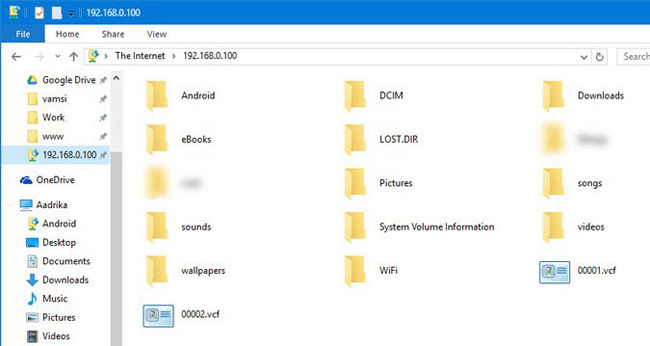
When you want to transfer files, just start the FTP server, enter the address shown in Solid Explorer into the browser window or file explorer. If everything is done properly, you will see your files and folders. Better yet, create a network connection from the PC to the FTP details. This allows you to browse the Android file system with Windows File Explorer.
3. Create a LAN / SMB connection
In Solid Explorer, this is one of the features that many users love. With just a few taps, you can create a LAN and SMB connection. Just like an FTP server, this helps you access files and folders on your PC via your Android device. You can also transfer media from your PC using this connection. Of course, you must first enable sharing for files, target folders or even the entire drive on your PC.

The way to do it is like creating an FTP server, tap the ' Add ' icon that appears in the bottom right corner, select ' New Cloud Connection ' and then select ' LAN / SMB .' This action will scan the entire network for sharing. If Solid Explorer can't find network shares, click the " Up Arrow " icon and enter it manually.
If you have read and write enabled on the network driver, you can simply drag and drop the file with the dual navigation feature.
4. Access Cloud Storages
Besides Dropbox, Google Drive is the main cloud storage place for many users. With Solid Explorer, you can connect all those cloud services with just a few steps and browse through them like any other folder or memory. Obviously, you can upload, download and play files on demand.

Just like with a LAN or FTP connection, click Add, select ' New Cloud Connection ', select the cloud storage service and follow the on-screen instructions. Solid Explorer supports all major cloud players like Dropbox, Box, OneDrive, Google Drive, Sugarsync, Copy, Mediafire, Owncloud, etc.
5. Hide files and folders
No matter who you are, there will be times when you want to simply hide your files, folders or media. The reason may be to loan your device to a friend, not to display all your personal documents or photos, etc. Fortunately, Solid Explorer has a simple way to quickly hide a file or folder. When hiding a file or folder, it will not appear in the regular file explorer nor listed in the corresponding player.

To hide a file, select the file, tap the Options icon and then select the ' Hide ' option.
To view hidden files or folders, open the menu, scroll down and select the ' Hidden Folders ' option. To show a hidden folder or file, just select the file or folder and tap the ' Undo ' button in the top navigation bar.
6. Encrypt & decrypt files and folders
Hiding files and folders is a good thing. But if the files are really important, it's better to encrypt them. Recent updates for Solid Explorer allow users to encrypt files and folders using AES256 encryption algorithm. Because Solid Explorer decodes quite clearly, you don't have to worry about re-encrypting them every time you access the encrypted file in the directory. Moreover, if your Android device has a fingerprint sensor, you can encrypt or decrypt files with your fingerprint.
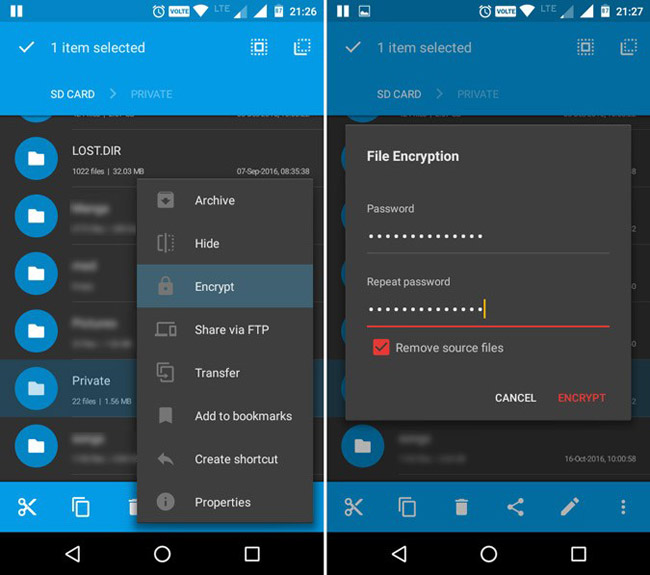
To encrypt a file, select that file, tap the option icon and then select the ' Encrypt ' option Now, enter the password and touch the ' Ok ' button. If you want to delete the source files, don't forget to select the ' Remove Source Files ' checkbox.
7. Store & extract files and folders
Do you want to create or open archives like ZIP, 7ZIP, RAR and TAR? You do not have to use any third-party applications. Solid Explorer actually supports these file types. In fact, you can open the archive file like any other folder. You can even transfer files to and from archives.
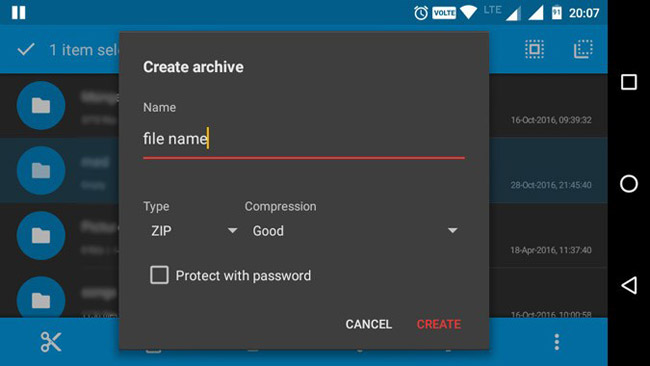
To create an archive, select the file or folder, tap the ' Options ' icon and select ' Archive '. Now, name the archive file, select the archive type, option to provide the password and then click the ' Create ' button.
8. Explore the root directory
If the Android device is rooted, you can browse the root directory for any reason. Thankfully, Solid Explorer supports native memory browsing.
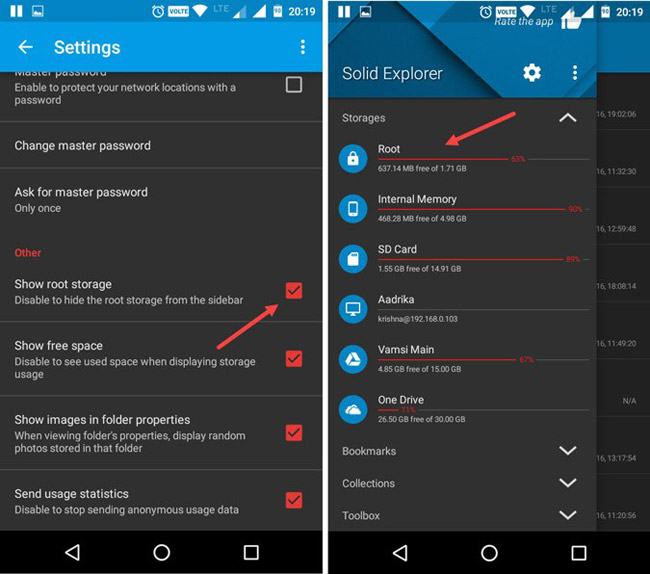
To access the root directory, open the menu and touch the ' Settings ' icon. Now scroll down and select the " Show Root Storage " option in the " Others " section. With the above action, you will see a new option named " Root " in the Storage section of the menu. Of course, Solid Explorer needs root access to access the original memory. Therefore, allow if there is a reminder message displayed.
9. Rename in bulk
Renaming files or folders is not difficult. But if there are too many files to rename, it takes a bit of time. To solve this problem, you can use the Batch Renaming feature. With this feature it is possible to use it with Reg Expressions.
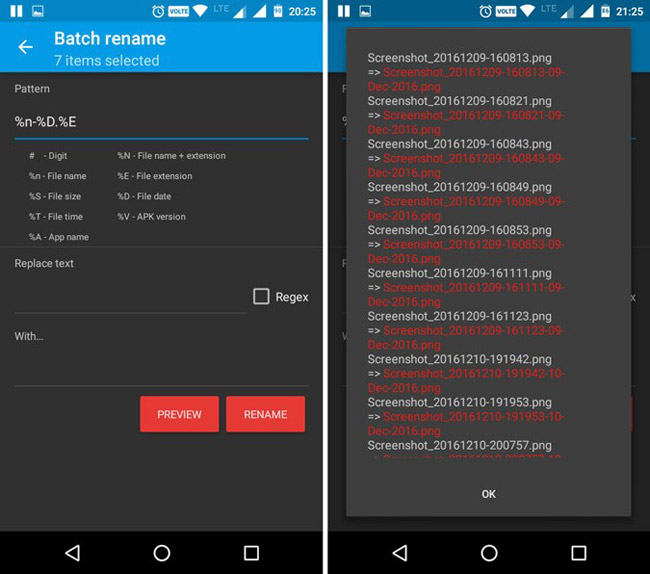
To rename multiple files, select all the files you want to rename and click the ' Rename ' icon. Now, enter the new name, add the reg expression and click " Ok " button. By clicking the ' Preview ' button, you can see what the renamed files look like.
Download Solid Explorer: https://play.google.com/store/apps/details?id=pl.solidexplorer2&hl=en
See more:
- 5 good file management applications on Android
- Top 15 best feature enhancement apps for Android
- How to install virtual assistant Google Assistant on Android 6.0 Marshmallow device and higher
You should read it
- ★ Warning File Explorer error on Windows 10 data loss when connected to Android
- ★ Top 15 best feature enhancement apps for Android
- ★ 5 best Windows File Explorer extensions to manage files on the system
- ★ Fix File Explorer error not working on Windows 10
- ★ 9 ways to enable File Explorer in Windows 10